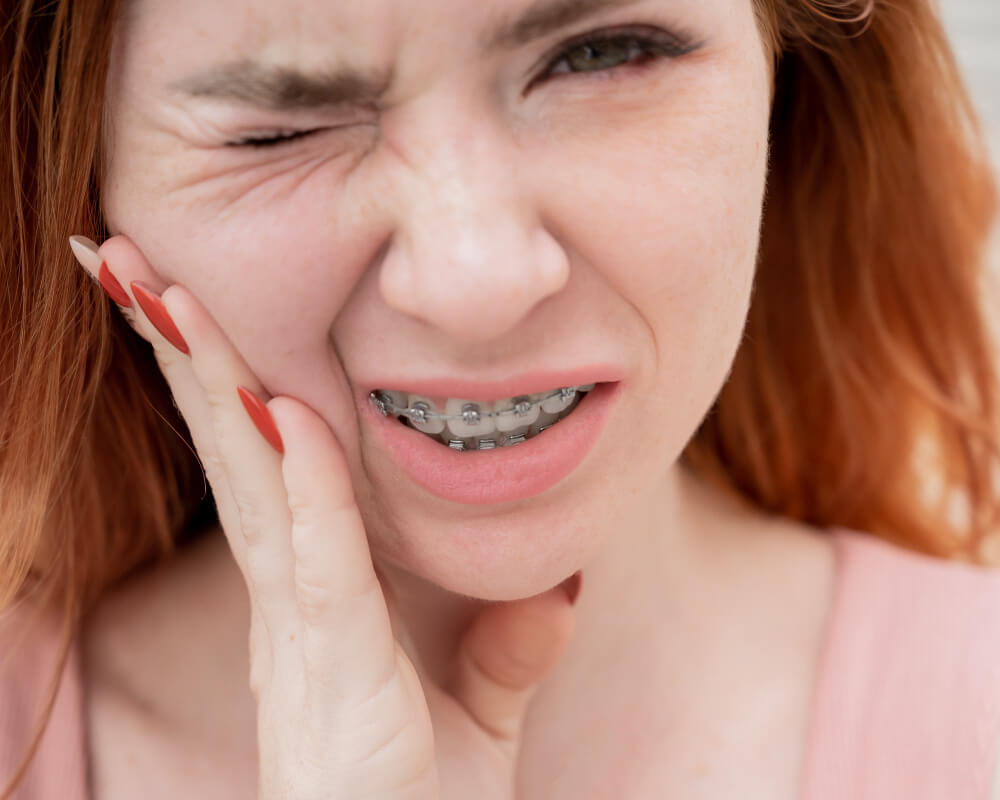
Newsletter Subscribe
Enter your email address below and subscribe to our newsletter

Enter your email address below and subscribe to our newsletter

Braces typically cause discomfort for a few days after each adjustment. This pain generally lasts between one to three days. To alleviate the soreness,use over-the-counter pain relievers, apply oral anesthetics, and eat soft foods. Cold foods like ice cream or smoothies can also help reduce inflammation and numb the area.
Key Takeaways
Braces hurt primarily because they apply pressure to the teeth to move them into the correct alignment. This pressure affects the gums and the bone structure of the mouth, leading to soreness and discomfort, especially right after getting your braces or following adjustments.
The brackets and wires can also irritate the inside of your mouth, contributing to the pain. Over time, as the teeth adjust to the new positions, this pain generally subsides. Using orthodontic wax and following your orthodontist’s care advice can help mitigate this discomfort.
Rubber bands on braces often cause significant discomfort because they apply extra pressure needed to correct alignment issues such as bite misalignments.
This additional force can lead to soreness in the teeth and jaws as they move more intensively compared to just wearing braces alone.
If the rubber bands are not placed correctly or if they’re too tight, they can increase the pain and irritate the areas they contact. Adapting to this level of discomfort usually takes a few days.
Managing this pain involves using over-the-counter pain relievers, applying orthodontic wax to irritated areas, and sticking to soft foods to ease the pressure.
Braces typically cause discomfort for a few days after they are first put on or after an adjustment. This pain usually lasts between one to three days. Managing the soreness involves using over-the-counter pain relievers, applying oral anesthetics, and eating soft foods. Cold foods like ice cream or smoothies can also help reduce inflammation and numb the area. If discomfort persists beyond a week or becomes severe, consult your orthodontist to ensure the braces are adjusted properly and no additional issues are present.
To stop stop braces pain immediately, consider these effective methods:
These home remedies and methods are generally effective in managing discomfort during orthodontic treatment.
Brace tightening can cause discomfort because it increases the pressure on your teeth and gums to continue moving them into the desired position. This discomfort is usually mild to moderate and typically lasts for a few days after each adjustment session.
To manage the discomfort associated with brace tightening, you can use over-the-counter pain relievers, apply orthodontic wax to any irritating brackets, and eat soft foods.
Cold compresses and cold foods can also help numb the area and reduce inflammation. If the pain seems excessive or doesn’t subside within a few days, it’s advisable to consult your orthodontist.
Getting your braces off typically involves minimal pain. Most people report feeling pressure or a slight discomfort as the brackets are removed, but this is generally not painful. The process of removing braces is quick and often leaves patients feeling relief rather than discomfort.
After the removal, there might be some sensitivity in the teeth and gums, as they adjust to the absence of brackets and wires. This sensitivity should diminish within a few days. It’s also common for there to be some residual adhesive on the teeth, which the orthodontist will clean off, and this cleaning process can cause a bit of discomfort, especially if the teeth are sensitive.
Braces typically stop hurting within a few days after they are first applied or adjusted. The initial discomfort usually lasts about one to three days as your mouth adjusts to the pressure of the braces.
The pain from braces can vary widely depending on the individual’s pain tolerance and the specific orthodontic adjustments being made. On a scale from 1 to 10, most people would rate braces pain around a 3 to 5 immediately after application or adjustment.
The most painful part of having braces typically occurs in the first week after they are initially placed and after each adjustment appointment.
During these times, the braces are applying pressure to shift the teeth into their new positions, which can cause significant discomfort. This pain usually decreases after the first few days as the teeth start to adjust to the pressure.
To alleviate braces pain at night, you can take over-the-counter pain relievers before bed, ensuring they are appropriate for nighttime use. Applying orthodontic wax to brackets that irritate the mouth can also help, as can rinsing with warm salt water to soothe sore gums.
Keeping your head elevated with an extra pillow may reduce blood flow to the area, potentially lessening pain. If discomfort continues to disrupt sleep, consult your orthodontist for additional strategies or adjustments.
Fact Checked
Our dedicated team rigorously evaluates every article and guide to ensure the information is factual, up-to-date, and free of bias.
Updated Regularly
We update our articles and reviews regularly to ensure you have access to the latest data in the dental industry.
The content on Dental3DU’s blog is intended for educational purposes only. This information should not be relied upon as professional medical counsel. Be sure to always consult with your dentist about the dangers and benefits of any medication, treatment or procedure.
Dental articles in your inbox. Subscribe